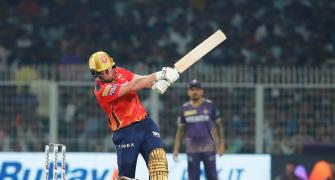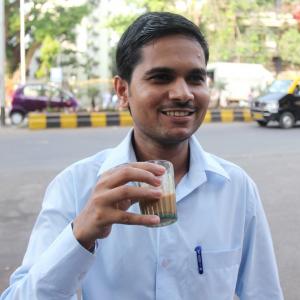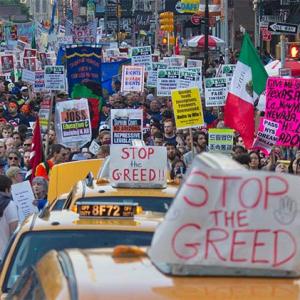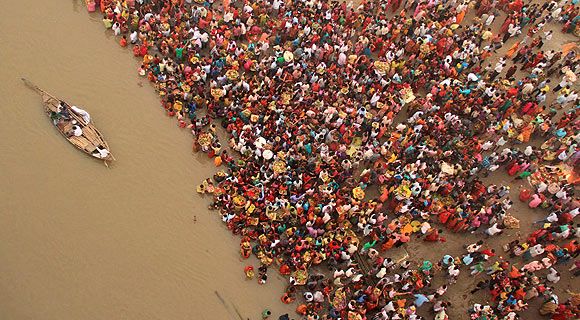
'70 per cent of sewage is flowing untreated into the river along its entire course. Hardwar and Rishikesh remain two of our holiest cities. Why has the government failed to do anything?'
'If Modi can do with the Ganga what he has done with the Sabarmati, that will be a major achievement.'
BJP MP Hukum Singh, chairman of the parliamentary committee on water resources, tells Rashme Sehgal that nothing has been done to arrest pollution in the Ganga.
Bharatiya Janata Party Member of Parliament Hukum Singh heads the parliamentary standing committee on water resources. Singh and the 21-member committee came down heavily on the government for having done little to arrest rising pollution levels in the Ganga and other water bodies. The committee's report was tabled in Parliament on April 27.
Singh, below, left spoke to Rashme Sehgal for Rediff.com in an exclusive interview.
Your committee has come down heavily on the government for not taking adequate steps to clean up the Ganga.
Our panel believes the government has a huge task ahead in clean up the Ganga. We tabled our report in Parliament on April 27, in which we pointed out that basic work on a series of projects such as the National Conservation Plan, the National Ganga River Basin such as beautification of the river has not taken place because expenditure on these schemes has yet to be incurred.
There have been no separate financial allocations on these schemes which all remain at the approval stage. So where has the first step to clean and rejuvenate the river been taken?
Did you travel on the ground to see the Ganga's pollution or have you arrived at theoretical assessments?
I belong to Muzzafarnagar and have grown up along the banks of the Ganga spending a large period of my youth in Rishikesh and Hardwar. In my childhood, the river was very clean. The last 15 years or so has seen the river become filthy because of the large quantities of untreated sewage and effluents being dumped in it.
As a first step, our parliamentary team decided to visit Rishikesh and Hardwar which is really the head of the river. Can you imagine what we saw?
Huge drains carrying untreated sewage being dumped into the river. The smell was so foul, we could not even stand there. Effluents from industry only serve to worsen the situation.
I remember, 30 years ago, Rajiv Gandhi launched an ambitious plan to clean up the Ganga for which he allocated over Rs 100 crore (Rs 1 billion). Now if you go to the towns of Roorkee and Hardwar, all the engineers associated with this project can be seen to have built palatial bungalows for themselves, but the river remains as dirty as ever. This is my personal observation.
Our 21-member team regrets that 70 per cent of sewage is flowing untreated into the river along its entire course. Hardwar and Rishikesh remain two of our holiest cities. Then why has the government failed to do anything on the ground?
Sewage treatment plants have been set up in these two cities.
STPs (Sewage treatment plants) may have been set up, but let me tell you that in most cities, these STPs do not work. This is often being done deliberately by local officials in order to save costs which they then go on to pocket. They use the excuse of lack of electricity.
I have spoken to a lot of officials who point out that things are not as simple as they appear. We did inspect the water supply systems as also visit the STPs but things have to be much more streamlined. The initiative has to be taken by the state governments.
Your team and you also visited Varanasi.
We did. But the situation there is no better. The story is the same with only 30 per cent of sewage water flowing into the Ganga after treatment whereas nearly 70 per cent of sewage flowed directly.
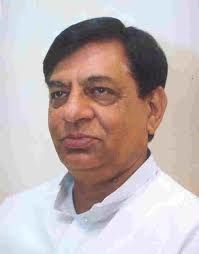 It is Prime Minister Narendra Modi's constituency. He has promised to clean up the river there.
It is Prime Minister Narendra Modi's constituency. He has promised to clean up the river there.
He is a man with a mission. He is also a decisive person. He is lucky that there is no one there who can challenge his decision. If he can do with the Ganga what he has done with the Sabarmati, that will be a major achievement.
Did your team visit the Sabarmati project in Ahmedabad?
Yes. The river appears like a small ocean and you cannot see even a twig in the river -- it is so clean. Twenty to thirty thousand people visit the Sabarmati riverfront every day and it has become one of the major tourist spots in the city. That is what we want to do with all our rivers and more so with the Ganga and the Yamuna.
Minister for Water Resources Uma Bharti is committed to clean up the Ganga, but she appears to be hamstrung by bureaucrats.
Uma Bhartiji is very committed. She gave a written reply in Parliament which only confirms what our committee has been stressing which is that presently 118 towns are discharging sewage into the Ganga.
In 2011, over 534 million litres per day of sewage was discharged in the river in Kolkata while 426 MLD was discharged in Kanpur.
In Varanasi, 295 MLD was discharged and 232 MLD in Allahabad while in Patna the quantity was 252 MLD.
She has been in the ministry for one year. She has warned factory owners and industrialists who are dumping effluents to clean up their act and ensure no polluted water is discharged into the river. We need to give her another year before results will show on the ground.
I am not in favour of even treated water from STPs being discharged into the Ganga. I believe this water can be used for agricultural purposes, but it should not be allowed to flow into the Ganga.
Of course, at present there is a new technology by which this sewage water can be treated and used for drinking purposes. A lot of oxygen will be pumped into this water. It is an expensive technology. Let us see how far the government can use it.
But there are many other problems that afflict the river apart from dumping of sewage and effluents. The river's natural flow has been affected because huge amounts of water are being diverted from Hardwar itself. This is something you must have noticed.
The Ganga is bifurcated into three separate parts in Hardwar. Local people complain that even Har Ki Pauri does not have enough water. The situation is so bad that between Saharanpur and Muzzafarnagar, the water of Ganga is being diverted at Deoband to feed the Yamuna canal.
The water that is flowing in the Yamuna in Delhi is really water from the Ganga. Today, sadly, the Yamuna has become a seasonal river.
Pollution levels have destroyed all aquatic life in these two rivers. There was time when contracts were given to fisherfolk to catch fish in the Ganga around Narora. Each of these contracts was over Rs 50 lakh (Rs 5 million). Today all that is finished.
Is this not a matter of great concern?
This should be a source of concern for every citizen in the country. We have 18 per cent of the world's population and only four per cent freshwater.
Our panel has listed that we had over 5.5 lakh (550,000) water bodies in the country. We have allowed many of these to dry up or get polluted. We are preparing a schedule whereby these water bodies can be revived with the help of state governments.
Earlier they used to say they had no budget for this kind of revival, but I do not agree. The new 2015 Budget has allowed state revenues increase by ten per cent. Uttar Pradesh, for example, will now get an additional budget of Rs 26,000 crore (Rs 260 billion) which can be spent on the revival of our ponds and other water bodies.
There has been a lot of misgovernance in the last five decades which has allowed major encroachment to occur in our water bodies. This must be dealt with very strictly.
Over Rs 27,000 crore (Rs 270 billion) has been spent on cleaning the Ganga with little to show on the ground.
I believe the next 12 months will make a difference after which the desired results will begin to show. Let us see how the situation unfolds.
Your panel suggested there should be only one national level tribunal to handle water disputes between states.
At present, we have six tribunals to handle water disputes between states. There is a tribunal for the Brahmaputra, the Cauvery, the Godavari and so on each headed by a retired judge. Unfortunately, none of these disputes have been resolved so far. In my opinion, the results are almost negligible.
We have one National Green Tribunal which is doing excellent work. Why cannot we have one National Water Tribunal to look into all disputes and resolved them in a time-bound manner?
REDIFF RECOMMENDS






